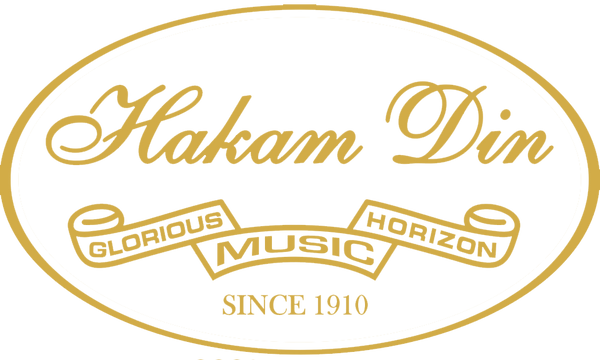
The Early Days of Hakam Din
Hakam Din was founded by Mr. Hakam Din, a craftsman who made musical instruments in Sialkot, a small city on the Indian sub-continent. Its history began more than one hundred years ago, in the 1890s, when the Royal British Indian Army was in need of Highland Bagpipes and asked Mr. Din to produce them. Although Mr. Din was not able to meet the entire Bagpipe needs of the Army’s bands, he received a letter of appreciation from the Director of Music, Captain A. Eldon of the Baroda State Army.
The letter stated:“Dear Mr. Hakam Din, thank you indeed for the supply of eight sets of Bagpipes to the Baroda Army. I have much pleasure in certifying to the quality and very fine workmanship displayed in the Bagpipes. The finish is excellent. I can strongly recommend them to any band which is considering the purchase of really good Bagpipes at very moderate cost.”
This letter changed the course of Mr. Hakam Din’s life. It encouraged him to plan for increased production, and consequently, he opened a new Bagpipe manufacturing facility in 1910.


at the National Museum of Scotland as the bestbagpipe from Asia
Expanding to Brass and Percussion
In the early 1920s, the company diversified into producing drums under its AKBAR Manufacturing division. The company offers a full range of modern marching drums for schools and professionals alongside its Renaissance range of rope-tension marching drums.
In the late 1920s, another milestone was achieved with the start of Hakam Din’s ANWAR Manufacturing division which was, at the time, the only manufacturer in Pakistan of brass instruments, from Bugles to Sousaphones.
Anwar Manufacturing expanded it’s operations in 1930 by producing Eugene Albert’s 13-key clarinets in Bb & Eb, which are still in production for both right- and left-handed players. The division expanded into piccolos, flutes, oboes, and saxophones in the late 1950s.



In 1929, the Hakam Din Group established offices in Calcutta and Quetta to explore business opportunities in Bengal, Balochistan, and neighboring states. Mirza Ashraf, Mr. Hakam Din’s eldest son, led the Calcutta office and served as the Chief Executive for 33 years.
The Calcutta branch closed before the partition in 1947. Mr. Allah Rakha, the younger brother of Mr. Hakam Din, managed the Quetta office until it closed due to a massive earthquake in 1930.
Recognition for Excellence
Anwar Pasha, a respected instrument maker and businessman, also served as a gifted Drum Major. He led the only band at Pakistan’s independence celebration during Quaid-e-Azam Muhammad Ali Jinnah’s visit. Although Mr. Jinnah passed away before visiting our facilities, his sister, Miss Fatima Jinnah, honored the commitment in 1950.
From 1947 to the early 1950s, the company remained closed due to constrained foreign trade and limited domestic demand. Despite this, The factory supported 110 workers without profit. In the early 1950s, Field Marshal General Ayub Khan's visit led to the creation of Pipe and Brass bands for Pakistan’s Defense Forces, equipping them with locally made instruments.


Recognition for our contributions to music came from a variety of sources, including a letter of appreciation from Pakistan’s President and visits from prominent figures like Chief Minister of Punjab Sir Abdul Rub Nishter, General Musa Khan, Prime Minister Zulfiqaar Ali Bhutto, and President General Zia-ul-Haq.



In 1963, a new facility was established in Abbottabad under the leadership of Mirza Asmat Pasha, the founder's grandson who launched the PASHA division to meet the demand for string and Eastern cultural instruments including Lute, Rabab, Banjo, and Ukulele. He also launched the MAHAD division, which produces high-quality band uniforms and accessories. Mirza Asmat Pasha had perfect pitch and a great passion for music. He acted as CEO till his unfortunate passing in 2021.



Commitment to Excellence
Since its humble beginnings, Hakam Din has grown into a globally recognized name under the leadership of its founder and his descendants. Today, the company remains dedicated to research and development, aiming to honor its history while focusing on a future of innovation. In 2010, NAMM awarded Hakam Din for its service to the musical instruments industry.

As we continue our journey, we reaffirm our mission to produce high-quality musical instruments, showing appreciation for our loyal customers and preserving a family legacy that spans generations.
